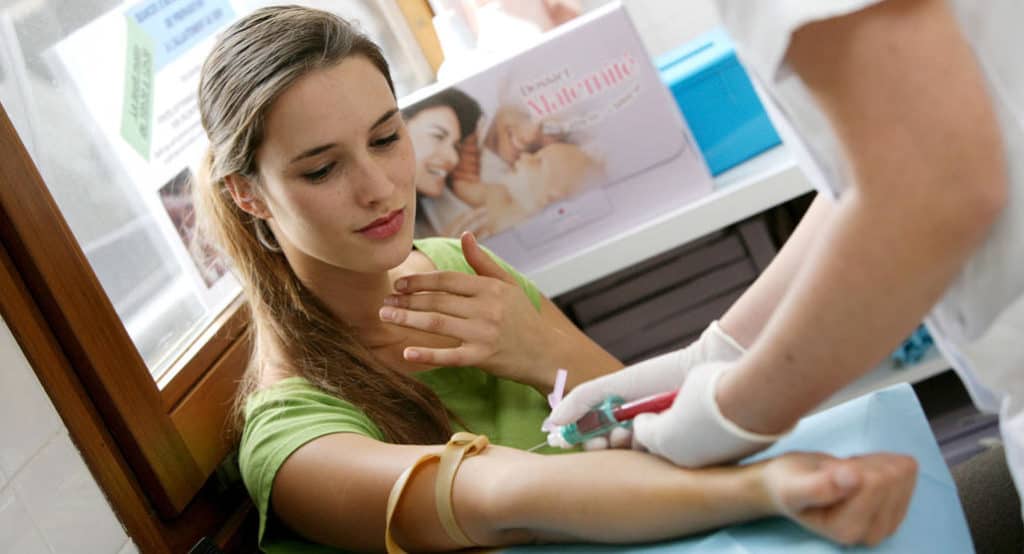
Table of Contents
Did you know that pieces of your baby’s DNA can be found in your bloodstream even as early as in your first trimester? A simple blood test from maternal blood can tell doctors more about your baby as early as in the first trimester with the blood draw.
To know more about this Non-invasive Prenatal Testing (NIPT) that’s making a genetic screening test more reliable, read below.
What is NIPT or Non-Invasive Prenatal Testing?
NIPT or Non-Invasive Prenatal Test is when the health care provider looks at DNA from your placenta and the baby’s placenta in a sample taken via a blood test. Here the doctor identifies using the testing done whether there is an increased risk of giving birth to a baby with a genetic disorder or a fetal aneuploidy. The doctor could also use a chorionic villus sampling to known the increased risk.
However, a screening like NIPT can only determine the likelihood of having that condition and not fetal aneuploidy. The prenatal screening does have 97-99% accuracy for three of the most common conditions.
If positive, it can help you and your healthcare provider decides the next steps browsing activity, including whether to have a diagnostic test like chorionic villus sampling CVS to make sure of the baby’s health and the risk factors like the chromosomal abnormalities according to the college of medical genetics.
These genetic tests analyze a baby’s own genetic material or the risk factors, to tell with 100% certainty whether a baby has any abnormality. However, they are invasive prenatal screening, which means there are chances of miscarriage according to the research information.
How does a health care provider do NIPT prenatal testing?
An Obstet Gynecol or obstetrician and gynecologist from the American College of Obstetricians states that testing is safe for both maternal and fetal health, lowering their high risk and not showing false positives. The screening involves only a quick blood draw with a needle and syringe in the first trimester.
Once the results are back, your healthcare provider will likely pair them with the results of your first-trimester ultrasound or nuchal translucency screening to see whether further testing is needed.
What does non-invasive prenatal testing (NIPT) provide?
The prenatal testing screens for the most common chromosomal disorders:
- Trisomy 21 (Down syndrome)
- Trisomy 18 (Edwards syndrome)
- Trisomy 13 (Patau syndrome)
These syndromes like the trisomy 21 down syndrome help as it takes a sample of a mother’s blood sample, some researchers think it may eventually also be a screening test or tool for moms, too.
This needs further research before practitioners begin using the tests for this purpose, but because the test could potentially detect early-stage cancer before, as the symptoms are apparent, it helps the women get diagnostic tests and care even before reaching the dreadful later stage.
Does a NIPT test for gender or et al using the cell-free DNA? And what are the different types of NIPT?
Yes, a NIPT non-invasive prenatal test does detect your baby’s health, baby’s Rh blood type and gender, or even the et al or the sex chromosome aneuploidies, by a test, not a diagnostic using the cell-free DNA c.fdna.
Four companies currently offer NIPTs prenatal testing: Genesis Serenity, Harmony, Natera, and MaterniT21. Here, each company offers different panels like some would offer a screen for triploidy and microdeletion, unlike the others.
While some brands companies between maternal and fetal DNA, others do not (which means they’re less accurate), so ask your practitioner which type of test she uses.
When is prenatal testing (NIPT) done and how is it accurate?
According to the American College of Medical, prenatal testing (NIPT) is performed any time after 9 weeks into your pregnancy.
Research suggests that it creates lesser false alarms than standard first-trimester blood draws screenings in the screening test. However, other research has shown that they are more accurate than those same standard screenings in predicting the risk of Down syndrome and Edwards syndrome.
Is it ok to get NIPT prenatal testing done?
Before prenatal testing NIPTs were only recommended for women at high risk for carrying a baby with a chromosomal abnormality or if there was any concern in the result of another prenatal test.
It is now recommended that doctors discuss all screening test options with all pregnant women, regardless of age or risk. This is to figure out which one, if any, is most appropriate. This is a personal decision. Ask your healthcare provider to spend some time going over all your choices.
Also, double-check with your insurance company to find out if NIPT is fully covered if not, how much it’ll cost before you get tested.
That’s all folks! This was all about the NIPT test. Do you wish to know more about the first trimester of your pregnancy? Don’t worry! All you need to do is simply click on the link and explore everything you’d need to know about
To Conclude
Getting the Non-invasive Prenatal Testing (NIPT)test done is not scary however you may be nervous about seeing the results. Consider talking to your healthcare provider or to a genetics counselor about what positive test results could mean for you and your baby. For many parents, knowing as much as possible as soon as possible brings a lot of relief.
If you know about the potential conditions early on it allows you to prepare for a special needs baby.
FAQs: Non-invasive Prenatal Testing (NIPT)
1) Does a NIPT take place in the first-trimester screening of the pregnancy?
2) Does NIPT prenatal testing replace amniocentesis?
3) Is NIPT prenatal testing more accurate than nuchal?
4) What is a fetal cfDNA test?
Reviewed By:

Esha Chainani - Obstetrician and Gynaecologist
Dr Esha Chainani is an Obstetrician, Gynaecologist and laparoscopic surgeon practicing in Mumbai. She aims to break the stigma around women’s health by advocating an inclusive and open practice of obstetrics and gynaecology. Esha is the author of several internationally published research papers and health articles in the media like the Swaddle. She founded Premaa, a non profit to reduce maternal morbidity and eventual maternal mortality by providing lower income pregnant women living in urban areas cell phone access through an app, to medically correct information proven to influence the outcomes of both mother and child. Her app Premaa pregnancy also has an entire section about contraception as well for a whole gamut of reproductive health. She has been on the panel for multiple health sessions including with the UN, USAID, BMC, gender at work and multiple non profit organisations. She’s also on the advisory panel of the South Indian medical students association. She is also an editor at the MAR Journal of Gynaecology. She advocates for accessible healthcare through her instagram account as well posting about reproductive health, mental health and sexual health.






